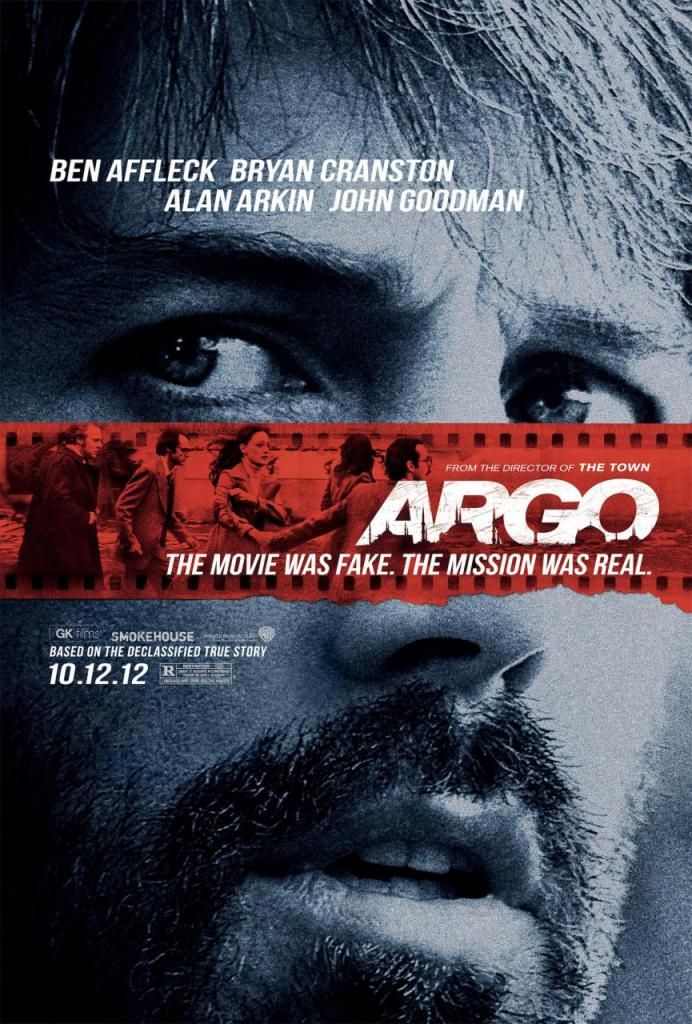Back this past summer or so I stumbled across this article on Wired.com talking about how during the Iranian Hostage Crisis there had been some other Americans who had gotten out of the embassy and managed to escape well before the rest of the hostages (who were still alive) were released (according to wikipedia the screenplay was actually based on that article, need a source on that though). Shortly afterwords I saw an ad for a movie called Argo and thought what a funny coincidence and it took me an embarrassingly long time to make the connection (I should've at least noticed that the article dated from 2007). For those who don't understand how history classes in the US go (or at least classes in the Midwest and South), American history/American involve in history is king yet, while you would think that would mean that high schoolers would have learned about the crisis, really those classes focus on the American Revolutionary War and American Civil War ad nasuem so it had never come up in any of my (advanced even) history classes. So, armed with only the knowledge from that article and what had come up in my nonfiction reading (I remember the characters briefly commenting in Persepolis that with the embassy closed that there would be no more visas but the hostage crisis was never mentioned) I headed out to catch the film at school and see how well it worked on the silver screen.
Argo
Summary: The year is 1979 and tensions are high in Iran due to all of the political upheaval and unease over the past few years. As our story begins these tensions come to a point and citizens storm the American embassy and take all the workers hostage, all but six that is who manage to escape and hide out in Tehran, almost as trapped as their colleagues. The CIA gets word of these six and starts to devise plans to get them out and for once it seems like the flashiest plan, to claim that their part of a fake movie production crew, might be the one that saves them.
The Good: Normally I don't like thrillers since they remind me a bit too much of conspiracy theories, both of them rely on the idea that there are people out there who are so much smarter than the average person and perfectly control everything (well except for that one moment that starts the plot/leads a person to concoct an insane theory) and that stretches my suspension of disbelief a bit too far. Here however we have a realistic set-up (growing tensions lead to an embassy being attacked and people in one building are situated in a way that lets them escape and then hide out with allies) and it's this setting that makes the rest of the story work. I also liked a lot of the dialogue on the American side of things (although sadly I think all of the snappiest lines were made up since they were in situations that weren't based on real events), although that leads to my biggest problem with the film.
The Bad: While I am okay with some dramatization of the events for the sake of a movie (the confrontation with the guards at the airport? Okay especially since it wraps up a character arc) but some of them were just silly (the scene following it, that was just unnecessary). Wikipedia (both the Argo [2012 film] and the Canadian Caper pages) has a whole section on historical accuracy, with sources, and it sounds like quite a few little details were changed and I highly recommend anyone whose seen the film to at least glance through, a few things in the film didn't ring true with me and sure enough they weren't. I suspect the reason for at least a few of the changes was to make the movie longer (it clocks in at 2 hours exactly and I had been curious how they were going to make a full length film with what is essentially, as odd as it sounds, a straightforward story) and after looking at Wikipedia I think they could've cut some of the fake events and instead focuses more on the Americans in Tehran (really the film was about Mendez, not the Americans) since they went through a lot more there which could've filled the time instead.
The Audio: No real comments here, the audio wasn't really important to the story (neither were the visuals actually, this is a story that also works just fine in print) but nothing stuck out to me for the wrong reasons so I suppose it was technically sound.
The Visuals: The film used some actual news reports from 1979 and I'm curious if some of the video of the protests in Tehran were also from 1979 since were were some shots there were letter-boxed (followed immediately afterwards by shots that were not). Regardless, the use of actual broadcast was a nice touch and was the only thing that really stood out to me visual wise (well, I have learned since that Mendez was part Hispanic so it's a bit frustrating that he was portrayed by a clearly all white guy).
So, while I enjoyed the movie while I was watching it (and was annoyed by some parts I knew to be dramatizations), after reading more about the history of the Canadian Caper I'm frustrated that they did dramatize some parts when they cut out other parts that could have helped fill the time and up the tension instead (and that there were a few lines in particular that paint some people/groups in completely the wrong light and could have been easily re-written so as to not do it). So I'm only going to give this movie a 3 out of 5 after all and probably won't rewatch it (then again I don't think it's the kind of story that benefits from rewatching anyway, regardless of historical accuracy).
